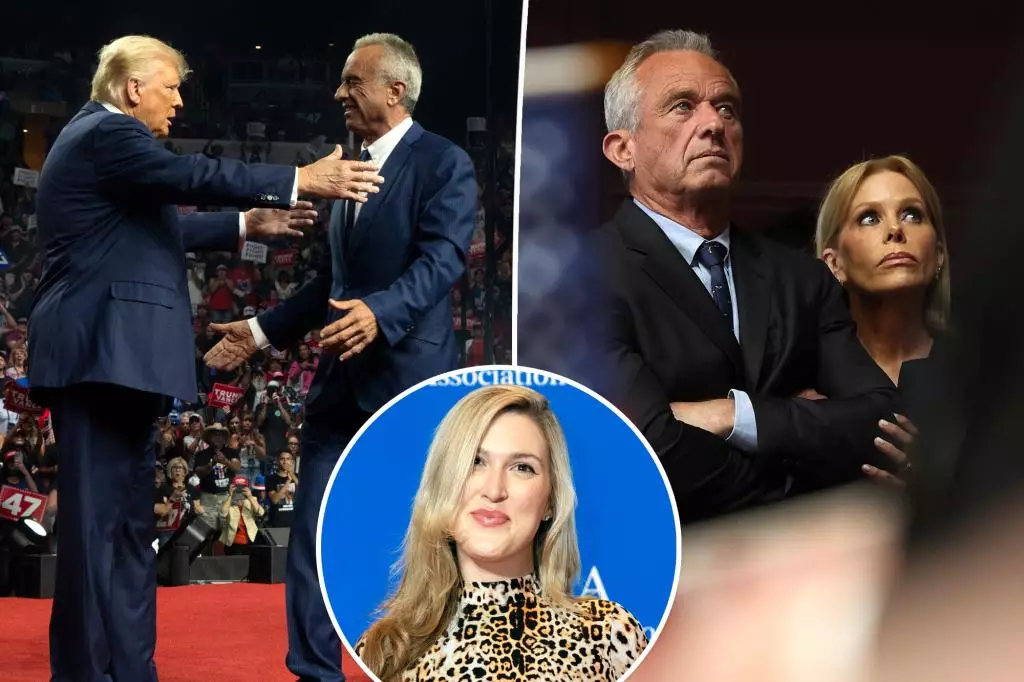In the complex world of politics, personal scandals can have a profound impact on public perception and career paths, especially within the turbulent environment of the Trump administration. Recent revelations concerning Robert F. Kennedy Jr.’s alleged romantic involvements have ignited discussions not only about the nature of political relationships but also about the evolving standards of accountability in modern politics.
The groundwork for this narrative began with Kennedy’s reportedly scandalous digital relationship with Olivia Nuzzi, a prominent reporter from New York Magazine. Following the disclosure of this connection, three additional women have come forward, claiming to have had romantic entanglements with the political figure. However, despite these revelations, political insiders suggest that Kennedy’s prospects for a role in a future Trump administration remain largely unaffected. This raises questions about the threshold for political misconduct in a time when public tolerance for personal scandal appears to be shifting.
According to sources within the GOP, many party members seem unfazed by Kennedy’s alleged indiscretions. A political insider commented, “We are not the party of George W. Bush anymore,” highlighting how the party’s ethos has shifted away from moral policing to a more pragmatic approach focused on election strategy. The idea that such personal matters can, in fact, elevate one’s political standing in certain circles indicates a fundamental change in the political landscape; what once may have been viewed as a “scandal” is now often brushed off as inconsequential.
Kennedy’s endorsement of Trump in August after withdrawing from his own presidential campaign illustrates the tightrope that many politicians walk. Even as personal setbacks unfold, the allure of political power often outweighs the potential risks associated with personal controversies. While there are concerns about the implications of Kennedy’s alleged affairs compromising his security clearance, there are also many opportunities available without the need for such clearance, especially in health-related sectors given Kennedy’s background.
Moreover, as insiders continue to speculate about the potential fallout from Kennedy’s romantic escapades, there seems to be an underlying belief that negative media attention will quickly fade. Resilience in the face of scandal appears to be a hallmark of contemporary political figures, especially within the context of the Trump administration, where past accusations of infidelity have had surprisingly little long-term impact on his political capital.
The intersection of Kennedy’s personal life and political career is particularly revealing. His reported affair with Nuzzi, characterized as a non-physical, but emotionally intense relationship, raises broader questions about the implications of personal relationships on public service. The ensuing scandal is complicated by Kennedy’s own history; previous comments in private diaries suggested a pattern of infidelity that could, indeed, colour public perception.
Meanwhile, Kennedy’s wife, actress Cheryl Hines, stands in a precarious position, reportedly distressed by not only the rumors surrounding her husband but also by his political alignments. This situation exemplifies the often turbulent waters that politicians and their families must navigate as personal and professional lives collide. The fallout from such affairs often extends beyond the individual involved, affecting family dynamics, public image, and even broader political narratives.
In a broader context, public response to scandals such as Kennedy’s reflects a seismic shift in societal norms. Allegations of infidelity that once might have derailed a political career seem to carry less weight, especially among audiences that resonate with leaders who appear authentically flawed and relatable. As the American political landscape continues to evolve, the implications of past indiscretions seem less about moral judgment and more about strategic positioning.
As political figures like Trump and Kennedy navigate the complexities of their personal lives, the lessons learned might very well redefine the expectations of those in political office. In an age where transparency is often less about rectitude and more about relatability, the rules of engagement are rapidly changing. What does that mean for the future of political leadership? Only time will tell if the embrace of such flaws leads to greater understanding across the aisle or if it simply reveals the increasingly complex interplay between personal failings and professional aspirations.


Leave a Reply